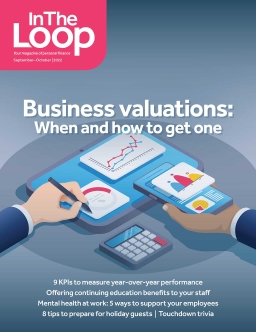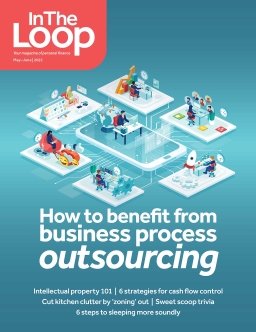6 strategies for cash flow control

Slow periods in your business are just part of the entrepreneurial journey. In fact, they can be a good thing: Downtime can provide the opportunity to review and reset revenue goals. That is, unless you can’t afford to bridge the gap between your typical flow of income and the unexpected shortage. The ability to analyze and control where your money is coming from—and how quickly—is fundamental to managing your cash flow.
These six tips can help ensure you have the right mindset and controls in place to keep your business cash flow strong and healthy:
1. Take the long view
It’s important not to panic if you find an ebb in your cash flow. If the business is your main source of income, you need to be prepared for the inevitable ebbs and flows of money. Plan to consistently add to a reserve throughout the year. Doing this ensures your business has the means to stay afloat during any downtime.
2. Hustle for more income before you need it
Don’t wait until there’s a reduction in your cash flow to start looking for new customers and revenue streams. Constantly network and nurture your client base to identify and earn new revenue opportunities.
3. Look for low-hanging financial fruit
The easiest and most efficient way to quickly increase your cash flow comes from your existing clients. Pitch a potential new project or follow up on a project that was put on the back burner. You could utilize your email marketing list or text marketing campaign for prospects, too.
4. Increase the cadence of your invoicing
Invest in an invoicing system such as QuickBooks® or QuickBooks Online to manage projects and billing. If you’re not using an accounting system to stay organized, now’s the time to start. Doing so will put you in a position to better manage your finances. This makes it easier to drive your cash flow in the direction you want it to go.
5. Maximize all potential revenue sources
If you have a product-based business, make sure you’re charging enough for your product(s) and not sitting on an abundance or overflow of inventory. Then, look at the possibility of adding new sources of revenue with additional products. If your business model is service-based, see what other services you can add to existing contracts for additional revenue. Once you’ve done that, it’s time to look at recruiting some new clients using the methods noted above.
6. Make a date with your inner collection agent and your CPA or accounting professional
We understand that calling and emailing clients who haven’t paid their invoices is anything but fun. However, it’s necessary—especially when you’re facing a cash flow issue. Start with the largest balances and then work your way down the list. If you’re still having cash flow issues after a few months, we encourage you to reach out to our team for a cash flow analysis. We can help you get your cash flow back on track.
Taking control of your cash flow is a critical part of being an effective business owner. Putting the suggestions above into place will help you keep your business profitable and give you peace of mind. Plus, you’ll have a clear picture of your finances so that you can be proactive—rather than reactive—with any future cash flow issues that arise.
Back to issue








